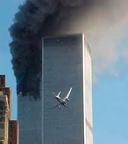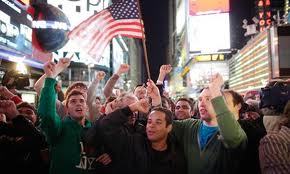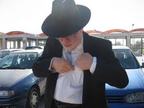Osama Bin Laden: To Celebrate or Not To Celebrate
Can you remember where you were when you learned when learned of the birth of Israel?
What about the assassination of JFK? 
Where were you on 9/11?
Where were you when you learned of the killing of Osama bin Laden?
I did not learn of his death until Monday morning.
As I turned on my computer and looked at my phone that morning, I saw a deluge of emails and Twitter tweets. The news was significant – after almost ten years, the mastermind of the most devastating attack on American soil had been brought to justice.
This was a day we expected and hoped for. I was reminded of the well-known joke: a fortune teller tells Osama bin Laden that he will die on a Jewish holiday. When Osama asks, which one, he is told that, “Whenever you die, it will be a Jewish holiday.”
I learned that the previous night, it had indeed become a holiday for some. Some people erupted with spontaneous joy and celebration at Ground Zero, Times Square, across from the White House, and in downtown Boston. Crowds gathered; some sang.
But: was that the appropriate response to this event? What does one say upon the death of someone who is a rasha – an evildoer?
Let me be clear. While we consider the appropriate response, there should no ambiguity about bringing justice to terrorist masterminds, be they leaders of Al Qaeda, Hamas, or others.
* * *
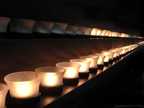
Let me begin with an important term I just used. Whenever we speak of a real enemy, we add the words Yimah Sh’mo, may his memory be blotted out. That dates, of course, from the episode when Amalekites attacked the Israelites from the rear just as they were leaving Egypt, picking on the most vulnerable, the women, the elderly, the children, the infirm.
The Torah commands us to blot out the memory of Amalek and never to forget to do so, which, of course, is an oxymoron.
How can we never forget to erase the memory of something?
We do it by adding the words: “Yimah Sh’mo – may his memory be blotted out” when we speak of an evil person.
So the first thing we can say is that Osama bin Laden, Yimah Sh’mo, a hater of Christians and Jews, of Israel and Israelis, of America and Americans, has been removed from the world.
My preference, quite frankly, would have been to have had Navy Seal Team No. 6 capture Osama bin Laden alive, bring him to a trial not unlike the Eichmann trial 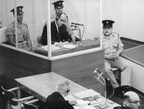
My other reaction was that justice had been carried out, though it had taken a decade to bring it about. This is both a reminder of how difficult it sometimes is to bring justice into this world and how, in the spirit of Rabbi Tarfon’s teaching, “velo atah ben horin lehibatel mimenah” we are not allowed to desist just because a task is difficult.
But what should we say or do in response to this moment?
Should we break into spontaneous chants of “USA, USA?” which occurred at baseball games when people learned the news, confusing the players who were the only ones in the stadium who had no way of knowing what had taken place.
Or is our response more muted?
* * *
Does our tradition offer a religious response to the death of a mass murderer?
One ancient text that addresses this is Mishlei, the book of Proverbs and it is quite contradictory. One verse states, “Do not rejoice when your enemy falls and do not let your heart be glad when he stumbles” (24:17) And another verse states (11:10), “There is jubilation at the fall of the wicked.”
How do we reconcile these two competing verses?
@#$% there a space between not rejoicing and jubilation?
There is something disturbing about watching people sing when a person dies. While there is a huge difference, think about how we all felt in the days after 9/11 seeing parts of the Arab and Muslim world celebrating after the devastating attack.
I think about how I feel every time there is a terrorist attack on Israelis or Jews in Israel or in other parts of the globe and I witness people celebrating. 
For me, there is a discomfort in celebrating.
But, as Tevye would say, “On the other hand” there is also something natural and understandable.
Let’s go back to our own people’s experience as they were trapped between the sea and Pharaoh’s army, and suddenly they were saved and Pharaoh’s army drowned. They cried out in jubilation and song.
It is only natural to rejoice at such a moment. Whenever evildoers are eradicated, our reactions are naturally of joy and thanksgiving.
A classic Midrash or rabbinic interpretation tells us that God rebukes the angels who are singing and rejoicing after Pharoah’s army drowns, saying: “The work of My hands are drowning in the sea, and you sing songs?” Whenever a human life is taken, even one that is bent on evil, it is a loss from God’s perspective.
It is interesting to note that the Midrash has God commenting to the angels but not rebuking the Israelites for whom there would naturally be a degree of joy.
A colleague shared with me a powerful teaching from Rabbi Kalman Shapira
Offering his own commentary on the midrash about the God rebuking the angels, the Rabbi Shapira taught: “Was an angel ever hit? Was an angel ever murdered? Was an angel ever humiliated? We were! The angels did not suffer as we did in Egypt, so they could not sing. But we did suffer – we suffered immensely – and therefore during the Exodus from Egypt ‘Moshe [could] sing.’”
* * *
And yet, on the other hand, another commentator, the Shibbolei Ha-Leket, states, “We do not recite a full hallel on the intermediate days of Passover or on the festival days of Passover because the Egyptians drowned at that time.”
This comment written some 800 years ago reminds us of what it means to be a moral person: that we should minimize our joy if someone else – even our enemy – suffers.

So what do we traditionally do upon hearing news? We recite a brakhah, a blessing. And there is a brakhah, a blessing that we recite whenever we hear bad news: Barukh Dayan Haemet – Praised is God, the Judge of Truth.
In my mind, we pray that when someone has died that they will receive justice in the world to come. We pray that their soul will continue in the next realm and that their influence will continue in this world; that somehow God will take care of them and, if they are an enemy, that their death is a measure of justice, as was certainly the case in this instance.
We recite this blessing whenever we hear the news of a death. In addition, it is recited with immediate mourners – those who experience the death of a brother, sister, mother, father, spouse or partner, or most painfully, a son or a daughter – when we perform kriyah, the tearing of our clothing. This reminds ourselves that we are connected to God even in the moments of brokenness and loss.
So, we could say a brakhah, but I wouldn’t say it in the same manner as when we say it for our own loss. For Bin Laden, Yimah shmo, it is not said with a tear or a tear.
But there is also another blessing that is much less well known, but maybe as important, if not more important. It is the blessing upon hearing good news: Barukh Hatov V’hameitiv – Praised are You, Adonai, our God, Ruler of the Universe, Who is Good and makes things better – who helps us acknowledge moments of joy and thanksgiving, moments when justice has been brought into the world. That is what we put in the headlines of our emails we send out when we are sharing news of a birth or good news of a simhah, a mazal tov. When we hear good news, we recite the blessing of joy.
I would like to recite that brakhah right now acknowledging that the world has become a better place because we have brought a measure of justice to it. Praise you Adonai our God who is good and brings even more goodness into the world.
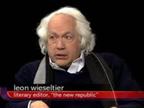
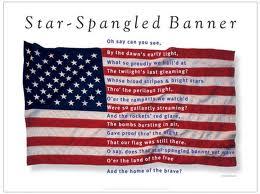

, he did not sing because that was not appropriate joy. That crossed a line.
To celebrate or not to celebrate?
We can be thankful when evil is eradicated, even an evil person. But in my mind, it is not the time to sing and dance. We don’t go out and dance the horah, even as we celebrate the application of justice in the world.
Instead, we remember that we are all created in the image of God, b’tzelem Elohim and when a person becomes so filled with hate, that he or she commits terrible crimes against humanity, God’s creation is diminished. What kind of world produces such people and such ideologies of hate? That is terribly upsetting.
In response to that WE must do the opposite: embrace life more.
As Jews, we celebrate life. “Uvaharta Hayyim,” the Torah states, “choose life.”
Perhaps now that Osama bin Laden, Yimah Sh’mo, is no longer among us, the world as a whole will embrace life more fully.

Lexington hosted them on their opening night a week ago Thursday, and then last Wednesday, I was with them again with a group of Christian clergy as they shared some of their experiences. They were a diverse group of men and women coming from different backgrounds, families from the former Soviet Union or Ethiopia. They served in different parts of the IDF, and they shared the complexity of what they have to face.
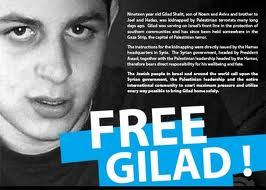
Later, these officers came up to me and told me how much this moved them – after all, any of them could end up like Gilad Shalit. One lieutenant in the Air Force, who flies F16’s and trains other pilots in this most advanced aircraft, told me through his tears that knowing that was extremely moving for him. He didn’t even think that we knew about Gilad, let alone thought about him every day.
Choking up he told me that we as Jews – and that he as an Israeli – embrace life. He does not celebrate death. This was an officer who participated in the 2006 Lebanon War and the 200/2009 Gaza War.
We should follow his example and celebrate the application of justice and embrace life in the world.
I conclude with the Prayer for Peace, based on the book of Amos (5:24): “Let love and justice flow like a mighty stream. Let peace fill the earth as the water fill the sea and let us say: Amen.”
This post has been contributed by a third party. The opinions, facts and any media content are presented solely by the author, and JewishBoston assumes no responsibility for them. Want to add your voice to the conversation? Publish your own post here. MORE



